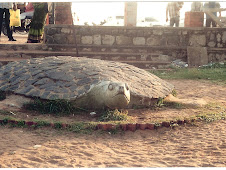A little over 25 years ago, I borrowed a bike, and with my friend in tow, went off to see my grandfather. We
did not have a phone at home and neither did my grandfather have one in his. It
was far simpler to get on a bike and ride out from Nungambakkam, to convey a
momentous bit of news to the old man at his house in Nanganallur.
Nanganallur in the early 1970s was rustic.
The Beach-Tambaram suburban trains did not stop there. Pallavan’s 18C rumbled
by maybe four times a day, connecting Nanganallur’s main roads to Madras’ Mount
Road. During the working days, menfolk were hard to spot, for there was nothing
in Nanganallur for them to work on. The retired gents would be resting inside,
cooling themselves with palmyra-leaf fans, while the women would be getting
‘things ready’. We kids had the streets to ourselves. Not just the streets, the
compounds of the houses too. We would jump over walls, wriggle under fences,
and even cut through barbed wire, if that gave us a tougher path from point A
to point B. We weren’t awed by retired Secretaries to Government, or District
Educational Officers, or Public Sector General Managers. But I was careful that
we did not trouble that retired Deputy Superintendent of Police. Not just because
he was a policeman. Not just because he was granddad’s friend. But also because
he had the only fridge within a 20km radius (I imagined) in those days and he
always smiled when he gave us ice cubes. Granddad and he – with a bunch of
other retirees – played bridge for hours every evening and no matter how much
they swore at each other during the session, I could still get my ice-cubes
from the DSP when I wanted them.
The late 1980s had changed Nanganallur. I
reached my grandfather’s house quite soon and had finished telling him about
having got my admission to XLRI (his response is recorded here), when the DSP
walks in. The oldies got to boasting.
“The boy says he is going to Bihar”, says
granddad.
“Really? My grandson is also going there”,
says DSP.
Granddad: “He’s going to do his MBA”.
DSP: “So is my grandson”.
Granddad: “He is going Jamshedpur, to
XLRI!”
DSP: “Is that right? So is my grandson!”
With a vague feeling of apprehension that
they were building up steam to swear at each other again, I ventured to ask the
DSP his grandson’s name.
“Bharath Chandran”.
At which my friend piped up. “Bharath
Chandran?!! Was he in PSBB?”, which left me wondering what I was doing in this oh-we-all-know-him
kind of gathering.
That was my first introduction to Brat.
Brilliant alumnus of PSBB, wonderful quizzer, had so many friends that he was
never at home… The first three times I went to his house to meet this
wonder-man in person, I came back disappointed. And then he walked in to my
house one morning. Bespectacled, stooping, fuzzy throated. And when he left 15
minutes later, he left me wondering how I was going to even hoping to compete
against such awesome brains.
XLRI changed many of us and sent us out in
different directions. But Brat went back to his family, to help his father run
his business and, at the same time, also help his grandfather, the DSP, run
his. That wasn’t easy, I guess, but it gave me a chance to meet the DSP several
times, for Brat and I met every evening, mostly after his work, but often when
he was winding down. And he and I
would sometimes remark about the curious, generation-skipping friendship. Not
entirely generation-skipping, actually, for our uncles were together for a
little bit, singing Elvis Presley songs and acting groovy.
The years went by and we saw less of each
other. Since November 2010, I hadn’t seen him at all. But there was no way I
could not think of him every day. He was struggling with multiple sclerosis,
being taken care of by his mother and his brother, away in Bengaluru. Some of
us tried to help, but there was only so much we could do. I didn’t have the
guts to go see him.
So, I will have no memory of him in
hospital beds. I can’t visualize him in the ICU. I can only see him walk into
my house in the morning light: I can only see him telling me that he is going
to go back to Dubai once the MS is under control: I can only see him laughing
out loud at the physiotherapist who is haranguing him to take his exercises
more seriously. I will not see him any other way, for there is nothing more of
him to see. The phone call on the morning of June 4 told me that.
Many of his friends from school, college
and XLRI will be at his shubam, the
13th day ceremony, later today. Almost all of them would have known
him for much longer than I have. They will all miss him. I will miss him too,
but maybe differently. I have anyway missed seeing him in the past couple of
years. I had already been missing the ‘usual’ Brat for the past 5 or 6 years. During
those years, when we did meet, he was happier talking about XL, or the few
years immediately after, than about anything else. Granddads entered the
conversation, too. He remembered my granddad almost as much as I remembered
his, even though he grew up in Madras city, away from Nanganallur. And now I
know those conversations can never happen again, and that a friendship spanning
three generations has come to a pause. I will miss a bit of myself.






